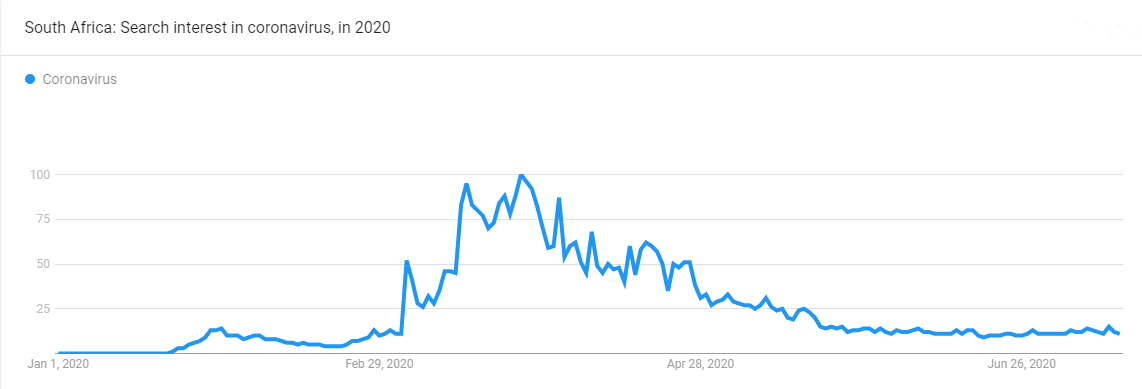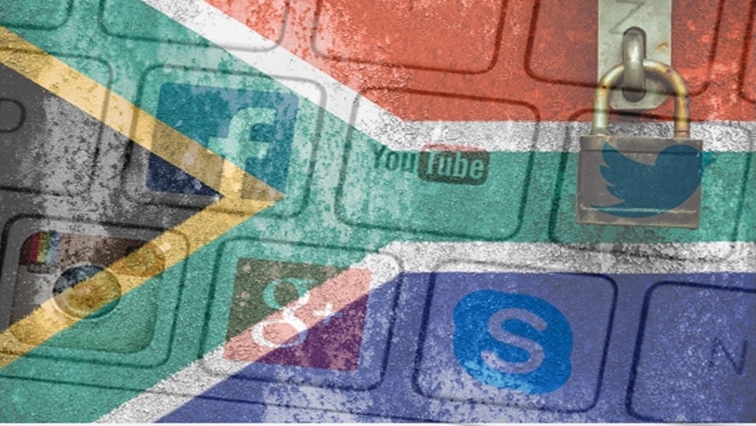South Africans went into lockdown in March 2020 and millions moved their social and business lives from the streets to the internet.
Business meetings, exercises sessions and parties moved online through various internet platforms including Google, Facebook and Twitter.
After more than 100 days in lockdown, SA’s online trends reflects the country’s concerns, likes and interests.
Since the beginning of the lockdown in March 2020, search engine giant Google saw a growing trend in searches relating to questions about coronavirus (COVID-19) as people tried to understand the disease.
What SA is searching for on Google
Since the beginning of the lockdown in March 2020, search engine giant, Google, saw a growing trend in searches relating to questions about coronavirus (COVID-19) as people tried to understand the disease.
Searches on Google noted a spike in coronavirus searches from South Africans in March as the country prepared to go into lockdown.
“Just before lockdown (3 March 2020), when COVID-19 was beginning to dominate the news cycle, South Africans were asking Google the following questions to help them get a better understanding of what the coronavirus is,” says Mich Atagana, South Africa Head of Communications and Public Affairs, Google.
The most searched questions on Google at the begging of the lockdown included:
- How many cases of coronavirus are there in South Africa?
- How did coronavirus start?
- What are the symptoms of coronavirus?
- What is coronavirus?
- When will coronavirus end?
- How to prevent coronavirus?
- Why is Italy so hard hit by coronavirus?
- Where does coronavirus come from?
- How long does coronavirus last on surfaces?
- What caused coronavirus?

Google searches on whether or not COVID-19 is airborne saw a spike as news about the possibility of the virus being airborne emerged.
As opposed to common searches about flu symptoms during the winter season in South Africa, Google says it has noticed a significant growth with searches for symptoms about coronavirus instead.

Alcohol recipes
The sale of alcohol was banned at the beginning of the national lockdown in South Africa. Google SA says a growing number of people looked to Google for recipes on how to brew alcohol at home.
“South Africans have always turned to Google when they needed help in making sense of the world around them. For example, when the sale of alcohol was banned in South Africa, people turned to Google to find recipes for homemade alcohol ,” notes Atagana.
Google searches on alcohol included:
- “How to make alcohol”
- “How to get drunk without alcohol”
- “How to make alcohol at home”
The sale of alcohol was reinstated in South Africa when the country moved from lockdown Level 4 to a more relaxed Level 3 lockdown in June 2020.
However, the sale of alcohol was suspended, with immediate effect, in July 2020 as the country recorded a spike in alcohol-related crimes and injuries.
According to Google, the Europe, Middle East and Africa (EMEA) region displayed a pattern in their search behaviour as they went into lockdown.
More people in the region searched for “Immediate needs.”
“They turned to search to find immediate answers to questions related to essential services and store opening hours, financial aid coverage and new payment methods, helping people in need and celebrating the efforts of frontline and essential workers,” says Atagana.
People also searched for ways to deal with daily lives with searches on ways to stay productive and active during the lockdown.
“For example, as a trend throughout, people were searching for information on grooming and baking at home; how to stay productive and learn new things and how to connect with their friends and family through digital platform,” Atagana says.
Google notes emerging behaviour of people looking to upgrade technology as they continue to stay at home. Spain, Italy and the United Kingdom saw an increase in Google searches for technology including “smart tv” as one of the most searched terms.
Facebook communities raise funds and find ways to stay connected
Social media platform Facebook says it has seen a massive spike in the number of active users on Facebook, Instagram, WhatsApp and Messenger.
“For the first time ever, globally there are now more than 3 billion people actively using Facebook, Instagram, WhatsApp or Messenger each month” says Facebook.
In South Africa, communities on the platform have used Facebook to raise support for those in need of assistance.
Members of the popular South African group “#ImStaying,” which has over one million members, raised funds for those who are in need of financial assistance amid the pandemic.
“We also recently launched Community Help, a place for people to request or offer help to neighbours, such as volunteering to deliver groceries or donating to a local food pantry or fundraiser,” says Facebook.
Italy was among the hardest-hit countries by the coronavirus in 2020. Facebook says it saw a 70% increase in the amount of time spent on the platform by people in Italy in March 2020.
Group calls on Facebook and Instagram increased as more people looked to connect while in lockdown. Facebook says Instagram and Facebook Live views doubled in a week in March 2020.
“We have also seen messaging increase over 50% and time in group calling,” notes Facebook.

Twitter trends look to life after lockdown
Twitter Client Solutions senior director Barry Collins says the social media platform witnessed a spike in COVID-19-related news since South Africa went into lockdown in March 2020.
According to Twitter, dominant trending topics included #StayHomeSA and #lockdownSA.
However, Collins notes how conversations on Twitter have shifted as people look forward to resuming life after the coronavirus lockdown.
“It’s also worth noting that Tweets mentioning COVID-19 make up a small percentage of the overall conversation on Twitter, especially in more recent months. People are looking forward to resuming activities like travel and going out, and talking about topics like politics, entertainment and sports,” says Collins.
Twitter says tweets mentioning “COVID-19” make up a small percentage of the overall conversation on Twitter in “recent months”.
South Africans are well known for their humour, even in the midst of a global pandemic.
Collins says SA’s humour and appreciation for frontline workers echoed on the social media platform.
“We’ve also seen an increase in the use of terms like ‘gratitude’ and ‘support’ as people thank frontline workers, family and friends. And with humour being a big part of South African Twitter, some great memes and jokes as people share in more light-hearted moments,” Collins says.
Fake news and misinformation amid the pandemic
Fake news and misinformation have increased as new consumption increased amid the coronavirus pandemic, according to the 2020 Reuters Institute Digital News Report.
“In our January poll across countries, less than four in ten (38%) said they trust most news most of the time – a fall of four percentage points from 2019. Less than half (46%) said they trust the news they use themselves,” notes Nic Newman, a Senior Research Associate at the Reuters Institute for the Study of Journalism.
Reuters conducted a study which included a survey of more than 80 000 online news consumers in 40 countries.
“More than half (56%) of our sample across 40 countries remains concerned about what is real and fake on the internet when it comes to news. Concern tends to be highest in parts of the Global South such as Brazil (84%), Kenya (76%), and South Africa (72%) where social media use is high and traditional institutions,” notes the study.
are often weaker

ABOUT CORONAVIRUS (APRIL 2020) – AVERAGE OF SIX
COUNTRIES
Google SA says has implemented additional features to curb misinformation around COVID-19. The company says it has launched “more than 120 products and features around the pandemic.”
These include a dedicated COVID-19 section in Google News across 40 countries and a dedicated microsite about COVID-19 in partnership with “the World Health Organisation (WHO), the Centre for Disease Control (CDC) and local governments and health organisations.”
Facebook says it continues to experience challenges relating to misinformation.
“We’ve been providing educational pop-ups in SA to ensure our users are seeing educational and accurate information across our family of apps,” notes Facebook.
Facebook says it has been removing content containing false information and conspiracy theories that has been flagged by global health organizations.
“We’re focusing on claims that are designed to discourage treatment or taking appropriate precautions. This includes claims related to false cures or prevention methods — like drinking bleach cures the coronavirus — or claims that create confusion about health resources that are available,” says Facebook.
Facebook says it continues to block people from running ads that attempt to “exploit the situation.”
“For example, claiming that their product can cure the disease. And we’ve banned ads and commerce listings selling medical masks,” says Facebook.
The social media platform says it has provided health authorities in different countries with “free ad credits” which enable them to run coronavirus educational campaigns on Facebook.
“On Instagram Information from WHO and local health ministries can be seen at the top of Feed and on hashtags related to COVID-19. We no longer allow people to search for COVID-19 related AR effects, unless they are developed in partnership with a recognized health organization” notes Facebook.
Twitter has broadened its definition of the term “harm” to ensure that credible information is shared on the platform.
The platform has introduced labels and warning messages that provide context on tweets containing disputed information relating to COVID-19.
“We have ensured the Events feature contains credible information about COVID-19 and is available at the top of the Home timeline for everyone in 30+ countries, including in South Africa,” says Collins.
According to the 2020 Reuters Institute Digital News Report, 56% of people polled in 402 countries worry about what can be considered as real or fake news online.

ALL MARKETS






